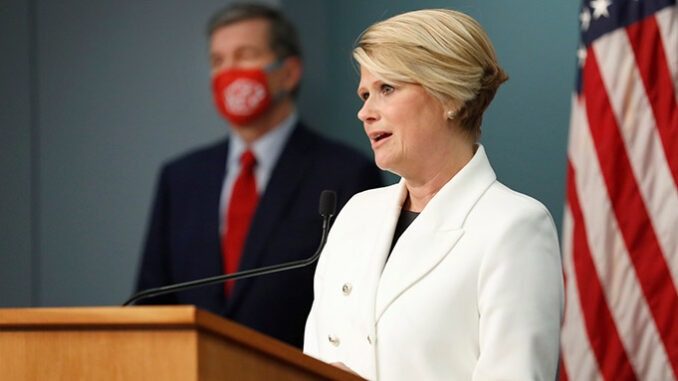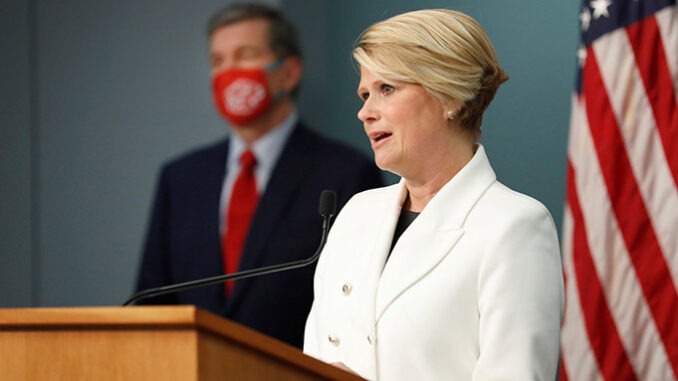

RALEIGH — N.C. State Superintendent Catherine Truitt is urging the General Assembly to attempt an override of Democratic Gov. Roy Cooper’s veto of a bill making governance changes to the NC Schools for the Deaf and Blind.
“This week should be one of celebration to recognize the positive work done to advance public education through the conference budget becoming law. However, I was disappointed to receive word that the governor had vetoed the legislation on the Blind and Deaf schools,” Truitt wrote to lawmakers. “His rationale had nothing to do with the merits of the bill but was instead about the appointments process.”
Truitt’s letter was sent to House Speaker Tim Moore (R-Kings Mountain) and Senate Leader Phil Berger (R-Eden) on July 13.
“The decision by the governor to take a political stand on a decades-long issue was not in the best interest of these children,” wrote Truitt. “Because one elected official disagrees with the appointments structure, does not mean it is “blatantly unconstitutional,” nor does it mean we should continue with the current structure when we know there is a better solution that has worked in other states, which is precisely what this legislation is modeled after.”
Cooper’s veto message indeed points to a single issue; the section related to appointments laid out in the 17-page bill.
“Not only is this bill blatantly unconstitutional, it continues this legislature’s push to give more control of education to Boards of Trustees made up of partisan political appointees. First the legislature seized control of all UNC system trustee appointments from the Executive Branch. They did the same with two of the state’s community college boards,” Cooper wrote in his veto statement of Senate Bill 593.
Cooper’s veto message continued, ignoring the appointments granted to the office of the governor in the bill.
“And now, this bill removes administration of the important NC Schools for the Deaf and Blind from the State Board of Education to a newly created board with 80% of the trustees, who may or may not know how to run these schools, appointed by the legislature,” wrote Cooper. “The students at the schools deserve steady, knowledgeable leadership rather than becoming a part of the erosion of statewide education oversight.”
Under current law, the State Board of Education has a supervisory role over all three schools. Additionally, the Superintendent of Public Instruction is responsible for the administration and oversight of the schools as well as staff appointments.
Senate Bill 593 would establish a separate governance structure for the Gov. Morehead School for the Blind, the Eastern North Carolina School for the Deaf, and the North Carolina School for the Deaf. The State Board of Education would still generally supervise the schools.
The measure also arguably adds more oversight by establishing boards of trustees for each school, each with 5 members; 2 members appointed by the General Assembly upon the recommendation of the Speaker of the House of Representatives, 2 members appointed by the General Assembly upon the recommendation of the President Pro Tempore of the Senate, and 1 member appointed by the Governor.
The state superintendent wrote that the bill “is an important piece of legislation that has been properly vetted, thoroughly discussed among multiple partners, and written while keeping the blind and deaf students of our state front and center.”
“Please consider overriding the veto of SB593 at the end of this month,” Truitt wrote.
In her letter, Truitt also describes the near-unanimous support in passing the measure in both legislative chambers as well as wide support from the Department of Public Instruction, input from the N.C. State Board of Education, as well as from the three current residential directors of the schools.
Cooper’s veto is at odds with the vast majority of Democrats who voted to pass the bill. In the House, the bill passed unanimously 109 to zero and in the Senate, the vote was 40 to four. The only four legislators across both chambers who voted no were Democrat Sens. Dan Blue (Wake), Michael Garrett (Guilford), Natasha Marcus (Mecklenburg), and Gladys Robinson (Guilford).
Given the enormous bipartisan passage of the bill, an override would seem like a likely conclusion unless Cooper pressures Democratic legislators to uphold his veto, as he has done in the past.



